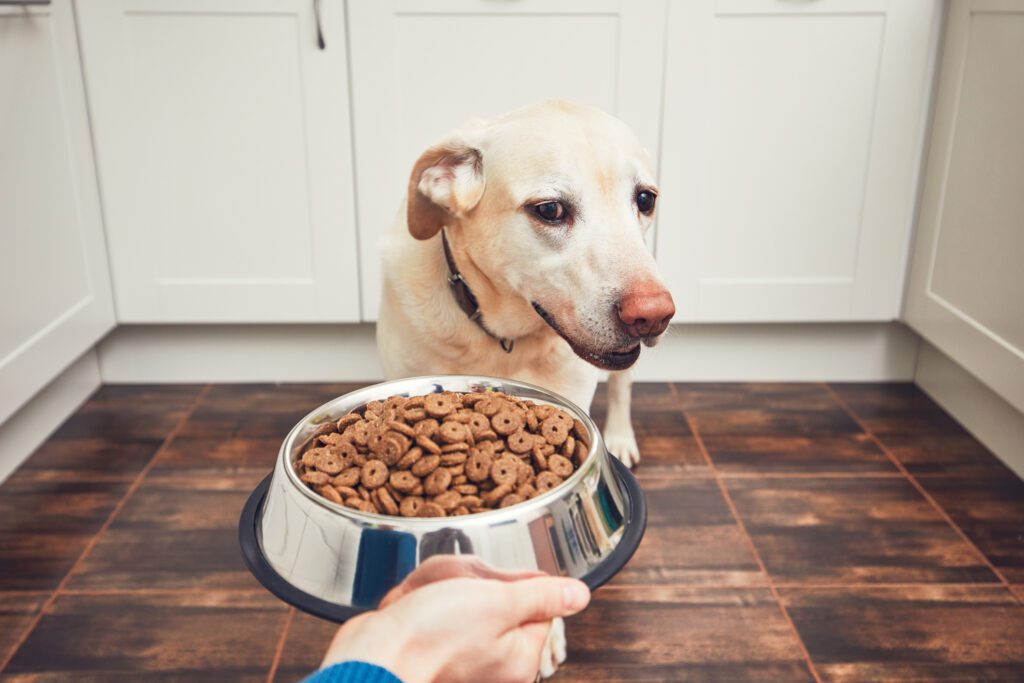What to Do If a Dog Isn’t Eating
A dog’s loss of appetite can often be the first sign of a potential health problem. This behavior, known as anorexia in the veterinary world, is not a disease in itself but a symptom of underlying issues.
In this blog post, we will comprehensively discuss what you, as a pet owner, can do when your dog isn’t eating, and when it’s crucial to seek professional help.
Understanding Your Dog’s Eating Habits

Before you can identify when your dog’s eating habits change, you need to understand what is normal for your furry friend.
Observing Your Dog’s Eating Patterns
Just like humans, dogs can have their unique eating patterns. Some are enthusiastic eaters, devouring their food as soon as it’s served. Others might be more ‘grazers,’ taking their time to finish meals.
Recognizing Abnormal Eating Behaviors
It’s crucial to recognize signs of abnormal eating behavior. This could range from your dog eating less than usual, completely refusing food, or showing disinterest in their favorite treats.
Unraveling the Reasons Why Your Dog Isn’t Eating
The reasons behind your dog’s loss of appetite could range from simple causes to complex medical conditions.
Minor Causes of Loss of Appetite in Dogs
A sudden change in environment, stress, or even a dislike for a new type of dog food can cause dogs to stop eating temporarily.
Serious Health Conditions that Influence Appetite
However, loss of appetite can also be due to more serious issues like dental problems, infections, kidney disease, or cancer.
The Influence of Mental Health on Your Dog’s Eating Habits
Mental health issues in dogs are often overlooked but can have a significant effect on their eating habits.
Effects of Stress and Anxiety on Canine Appetite
Just like humans, dogs can experience stress and anxiety, which can lead to loss of appetite. This could be due to various factors, like a new pet in the house, loud noises, or the absence of a family member.
Depression and Eating Disorders in Dogs
Depression can also affect a dog’s desire to eat. Other behavioral disorders such as pica, where dogs eat non-food items, can disrupt normal eating patterns.
Critical Situations: When It’s Time to Seek Professional Help
While an occasional missed meal might not be a cause for concern, persistent refusal to eat should be addressed by a professional.
Telltale Symptoms of Serious Health Issues
If your dog has not eaten for more than 48 hours, or they’re displaying additional symptoms such as vomiting, diarrhea, lethargy, or sudden weight loss, it’s time to call us.
The Importance of Timely Veterinary Intervention
Timely intervention can make a significant difference in your dog’s recovery and help prevent any potential complications.
Home Remedies to Encourage Your Dog to Eat
If your vet has ruled out any serious health concerns, and your dog is simply being a fussy eater, you can try a few strategies at home.
Making Mealtime Appealing for Picky Eaters
You can make their mealtime more enticing by adding a bit of wet food or low-sodium broth to their regular kibble or trying new flavors of dog food.
Medical Interventions and Dietary Adjustments for Dogs with Poor Appetite
If home remedies aren’t successful, your vet might recommend medical treatment or dietary adjustments.
Prescription Appetite Stimulants and Nutritional Supplements
There are various appetite-stimulating medications and dietary supplements that can help boost your dog’s desire to eat.
Therapeutic Diets for Dogs
Your vet may suggest a therapeutic diet, especially formulated to manage specific health conditions.
How Merrimac Valley Animal Hospital Can Assist
At Merrimac Valley Animal Hospital, we believe in providing comprehensive care for all our furry patients.
Comprehensive Veterinary Services for Dogs
Our skilled team of vets and animal health professionals can diagnose and treat a wide range of conditions, helping your dog regain their appetite and ensuring their overall wellbeing. If you’re concerned about your dog’s eating habits, don’t hesitate to get in touch with us. Call us at (978) 388-3074 to make an appointment. At Merrimac Valley Animal Hospital, we’re dedicated to ensuring your pet lives a happy, healthy life.
Recent Posts
About Us
Merrimac Valley Animal Hospital had humble beginnings in 1968. Dr. Walter Brown opened the animal hospital in a garage next to his home near the current hospital and operated out of this small space until the current building was built in 1969.
